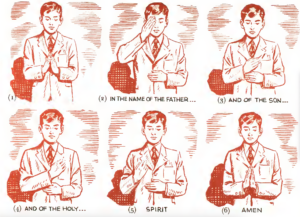
This questions seem to plague message boards. I want to think that these come from a good place and are born of poor catechesis. Sometimes these questions may be born from scrupulosity. In the following text, I aim not to list what is and isn’t a sin but rather give some guidelines on identifying sin.
Firstly we must come to an understanding of what sin is. “Sin is an offense against reason, truth, and right conscience; it is failure in genuine love for God and neighbor caused by a perverse attachment to certain goods. It wounds the nature of man and injures human solidarity. It has been defined as “an utterance, a deed, or a desire contrary to the eternal law.” ¹ Essentially we can determine something is a sin when it is contrary to love for God or neighbor.
There are four big questions to ask when determining if something is a sin. The first is does this damage my relationship with God or Man or even yourself? It is in the very nature of sin to damage the communion between us, our neighbors, and especially God. If an action or actions break this communion it is likely a sin. So, how do you answer this?
The second is does the action breaches the Ten Commandments. Often, churches will provide something called an examination of conscience. This document lists several sins organized around the Ten Commandments. Although these aren’t what I’d consider a catch-all they’re a great starting point. Examinations of conscience are great tools to both prepare yourself for confession and also learn to examine your conscience through a Catholic lens. If there is something you think is a sin and it isn’t on the examination of conscience that doesn’t mean you are necessarily absolved of guilt.
The third is was the action against your conscience? If the action was against your conscience it’s best to also look into what the church teaches. The problem with a person’s conscience is that while the Holy Spirit can act on our consciences it can also be deceptive. The church doesn’t have teachings on everything. If your conscience is telling you something is wrong though the church may have spoken on it.
The fourth is whether it is a venial or mortal sin. Of course, all sin is bad but mortal sins are more serious than venial. Venial sins are damaging but mortal sins destroy our communion with God and the church. Mortal sins are so damaging that they require mending and that is why we have the sacrament of confession ².
Mortal sin has three main criteria. “For a sin to be mortal, three conditions must together be met: “Mortal sin is sin whose object is grave matter and which is also committed with full knowledge and deliberate consent.” ³. The first criterion is for it to be a grave matter. Interestingly, the church defines a few sins as a grave matter such as murder but does not define “grave matter” itself. The second is that the sin must be completed with full knowledge. If you commit a sin unaware that it is a sin you do not have full knowledge. The third is that there must be deliberate consent. This is a recognition that sinning under threat of your safety or under mental impairment is not the same as committing a sin of your free will.
So, in short, when determining if something is a sin ask the following.
- Does this damage my relationship with God or Man or even yourself?
- Does the action breach the Ten Commandments?
- Was the action against your conscience?
- Was it a grave matter?
- Did you have full knowledge?
- Did you do it with deliberate consent?
¹CCC 1849
²CCC 1855-1856
³CCC 1857

 First Sorrow: Mary Hears the prophecy of Simeon in the Temple
First Sorrow: Mary Hears the prophecy of Simeon in the Temple Second Sorrow: Mary flees with Joseph into Egypt to save Jesus
Second Sorrow: Mary flees with Joseph into Egypt to save Jesus Third Sorrow: Mary loses Jesus and finds Him again in the Temple
Third Sorrow: Mary loses Jesus and finds Him again in the Temple Fourth Sorrow: Mary meets Jesus carrying the cross on the way to Calvary
Fourth Sorrow: Mary meets Jesus carrying the cross on the way to Calvary Fifth Sorrow: Mary is present at the Crucifixion and Death of Jesus
Fifth Sorrow: Mary is present at the Crucifixion and Death of Jesus Sixth Sorrow: Mary receives the dead body of Jesus in her arms
Sixth Sorrow: Mary receives the dead body of Jesus in her arms Seventh Sorrow: Mary accompanies Jesus to His Burial
Seventh Sorrow: Mary accompanies Jesus to His Burial
Hey, anyone checked out Plus777link lately? Seems like they’ve got some new games! Been having decent luck; maybe you guys will too! Give it a shot and let me know what you think! Check them out here: plus777link
811bet1 is okay, nothing to write home about. But hey, if you’re looking for a new place to drop a few bucks, why not? Good luck out there. 811bet1
Was looking for the Nesine APK and this site had the info I needed. Finally got it downloaded! nesine apk
Yo, tried some spins on sg77slot. Got a couple small wins, nothing crazy. Site’s easy to navigate though, which is a plus. Check them out: sg77slot